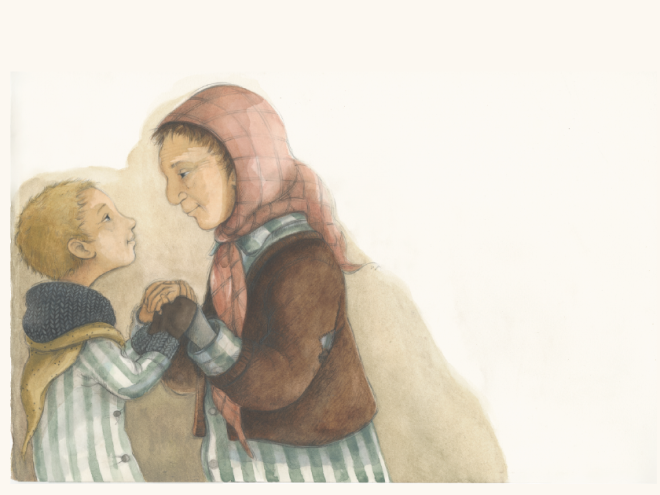Young Werner, his father dead, his mother last seen marched off before being loaded onto a cattle car, and his sister in hiding, is alone in the “Family Camp of Auschwitz.” There he meets a prisoner, a sweet and gentle man named Levin. The two share a wooden bunk. Days and nights of fear, exhaustion and punishments of prisoners follow, described in print and illustrated in sepia tones that broadcast the doom and despair of the camp, some stretching across the top of two half pages, others not, but all wonderfully expressive. Werner thinks his bunkmate too gentle for this terrible place and soon finds out that he was a famous magician known in Europe as “The Great Nivelli.” Herr Levin produces one card trick after another to amuse the guards upon demand. Werner thinks that the guards will be grateful for the entertainment and perhaps give the magician extra food. What he does not understand is that should the guard fail to be entertained, or if Levin runs out of tricks, the magician’s life would be ended. To console Werner, whose bread has been stolen by another prisoner, Levin teaches him a card trick. After a while, Werner catches on and is able to perform the trick. “For just a moment, the misery of Auschwitz melted away. Someone had cared about him and given him hope.” In a segment at the end of the book called “How it Happened,” among the photos, are Werner’s parents, his sister Renate and himself at ages 11 and 14. After the war, Werner developed a life-long interest in magic.
The book had a wonderful surprise ending for me because Werner is my friend in real life who testifies to children and adults at the Holocaust Memorial and Tolerance Center of Nassau County, which I did not realize until the last few pages of the book! These final pages follow up the story with current pictures of Werner and his wife, Eva, and tell what happened to him and his sister after the war. I had never heard this story before! This is a wonderful book for ages 8 – 12, but Werner says that he has told his story, somewhat modified, to children as young as 7.



